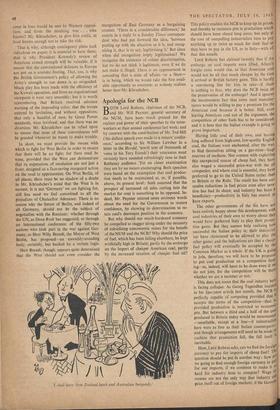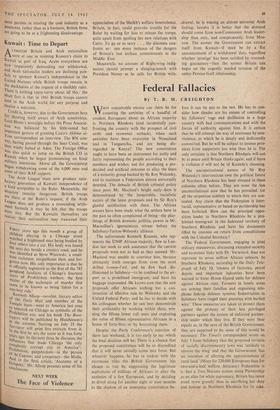Apologia for the NCB
BOTH Lord Robens, chairman of the NCB, and Mr. Will Paynter, general secretary of the NUM, have been much praised for the realism and power of their speeches to the mine- workers at their annual conference last week; and by contrast with the contribution of Mr. Ted Hill ('the daftest speech ever mado to a miners' confer- ence,' according to Sir William Lawther in a letter to the Herald, 'worth tens of thousands of votes to his Tory friends') their utterances must certainly have sounded refreshingly sane to their Rothesay audience. Yet on closer examination they are by no means encouraging. Both speeches were based on the assumption that coal produc- tion needs to be maintained at, or, if possible, above, its present level: both assumed that the prospect of increased oil sales cutting into the market for coal is something to be opposed. In- deed, Mr. Paynter uttered some ominous words about the need for the Government to restore confidence, by showing its determination to re- tain coal's dominant position in the economy.
But why should our much-burdened economy be compelled to stagger along under the necessity of subsidising uneconomic mines for the benefit of the NUM and the NCB? Why should the price of fuel, which has been falling elsewhere, be kept artificially high in Britain; partly by the embargo on the import of cheaper American coal, partly by the increased taxation of cheaper fuel oil?
'I shall have New Zealand Iamb and Australian burgundy.'
This policy enables the NCB to keep up its prices, and thereby to maintain pits in production which should have been closed long since; but only at the cost of compelling industrialists here to paY anything up to twice as much for their fuel aS they have to pay in the US, or in Italy—with all that this entails.
Lord Robens has claimed recently that if the embargo on coal imports were lifted, Atlantic freight costs would rise, so that American coal would not be all that much cheaper by the time it arrived at British factory gates. This is hardly a convincing line for him to take—if there is nothing to fear, why does the NCB insist on the preservation of the embargo? And it ignoiel7 the inconvenient fact that some steel manufl turers would be willing to pay a premium for the American coal because it is better. Still, even leaving American coal out of the argument, the competition of other fuels has to be considered; and it is here that the Italian example is going to prove important.
Having little coal of their own, and havi long suffered from high-cost, low-quality Engl coal, the Italians were enchanted, after the w to find themselves sitting on a gas-mine—ht. reserves of methane. Not content with exploiti this unexpected source of cheap fuel, they ha also waged a successful price-war with the companies; and where coal is essential, they ha preferred to go to the United States rather th to Britain or the Ruhr. The result has been st cessive reductions in fuel prices even after to, tion has had its share; and industry has been beneficiary—productivity in Italy has soared, have exports.
The other governments of the Six have r ot been entirely happy about this development; with coal industries of their own to worry about tboY would have preferred Italy to play their proti c. tion game. But they cannot help realising hog' successful the Italian policy is; their industrial' ists have clamoured to be allowed to play the other game; and the indications are that a cheap' fuel policy will eventually be accepted by the Common Market as a whole. If the UK is going to join, therefore, we will have to be prepaid to put coal production on a competitive foot' ing—as, indeed, will have to be done even if We do not join, for the competition will be there whether we are a member or not.
This does not mean that the coal industry hi is facing collapse. As Georg Tugendhat insist in his Spectator article last month, the NCB perfectly capable of competing provided that accepts the terms of the competition—that provided production is restricted to econon pits. But between a third and a half of the et produced in Britain today would be uneconon —unsellable, except at a loss—if industriali here were as free as their Italian counterpart and though arrangements will need to be made cushion that production fall, the fall itself inevitable.
How, Lord Robens asks, can we find the force currency to pay for imports of cheap fuel? Vic question should be put in another way: how f we going to find enough foreign currency to IN'Y for our imports, if we continue to make it 5° hard for industry here to compete? Wage creases are not the only way that industry oal/ price itself out of foreign markets; if the Gov:icl
jig
sb r, jig ve oil ve an c.
a as ment persists in treating the coal industry as a Pensioner, rather than as a business, British firms are going to be at a frightening disadvantage.



































 Previous page
Previous page